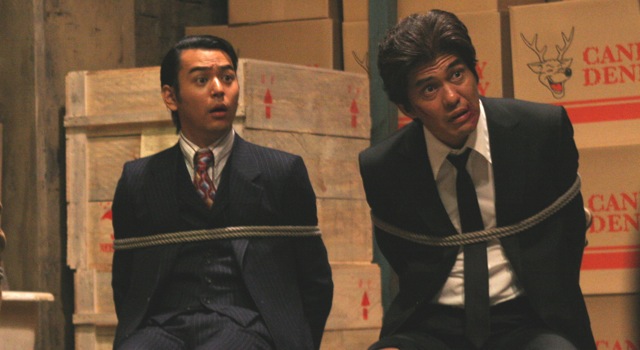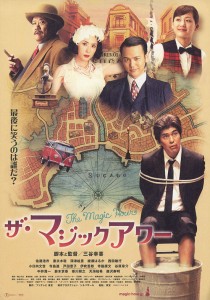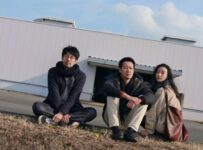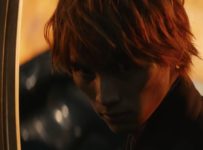Director: Koki Mitani
Runtime: 136 minutes
Starring: Satoshi Tsumabuki, Toshiyuki Nishida, Koichi Sato
Country: Japan
Rating: Highly Recommended (?)
Koki Mitani is known as being the King of Comedy in Japan, and rightly so. His work in theatre and film has attracted audiences in large numbers, but he remains largely unknown outside of his native Japan. JFF15 aims to change that this year, not only with his latest film A Ghost of a Chance opening the festival in grand fashion but by staging a retrospective of his films that includes the madcap Suite Dreams and this 2008 comedy, The Magic Hour (ザ・マジックアワー).
When gangster Noboru Bingo (Satoshi Tsumabuki, Villain) is caught having an affair with Mari Takachiho (Eri Fukatsu, A Ghost of a Chance), the wife of crime syndicate boss Konosuke Tessio (Toshiyuki Nishida, Star Watching Dog), he is almost certainly done for. Convincing the boss that he knows the famed hitman Della Togashi, he is told that he must find him or die. Desperate, Bingo does the only thing that he can think of: hires struggling actor Taiki Murata (Koichi Sato, The Last Ronin) and convinces him to play the part. The only problem is that Murata really believes that he is in a film, and he is so convincing that he inadvertently leads everyone into a gangland war.
The “magic hour” of the title is a film term that refers to the time between dusk and nightfall, when the last lingering rays of light from a setting sun give an unearthly glow to the scene. Mitani rather knowingly based his film around this concept, in fact trapping his tale inside a kind of time bubble of a non-Japanese town of the 1920s or 1930s. The town he has constructed for the film is, in fact, a lavish set the kind of which is rarely seen in modern cinema, let alone Japanese cinema, giving the film the same otherworldly aura that “magic hour” is said to give photography. Early in the film, the waitress, Natsuko (Haruka Ayase) actually observes: “Doesn’t this remind you of a film set?”. The Magic Hour is a kind of throwback to the screwball comedies of the era that it clearly admires, filtered by way of Paper Moon, Billy Wilder and Woody Allen[1]. It’s a lighthearted affair, with a ridiculous premise at its core, and these are just some of the many reasons to fall in love with Mitani’s now classic comedy.
Like a number of Mitani film before it, it may go on a little longer than it needs to, but anything this fun warrants extra time spent on it. Toshiyuki Nishida, best known outside of Japan for playing Pigsy in the popular Monkey TV series, recalls his hammy origins despite being nominated for ten Japanese Academy Awards and winning two of them. His affable cluelessness sells the seriously ridiculous high concept of the film to the point of believability, and the ease at which Satoshi Tsumabuki slips into the frustrated “straight man” role shows why his committment to diverse roles has seen his star rapidly rise in the last decade, not to mention why he was cast as the Exceedingly Handsome Guy in The Fast and the Furious: Tokyo Drift.
Fans of classic cinema will find much to enjoy in The Magic Hour. In addition to Mitani’s regular cast of characters, such as Shingo Katori returning as his role from Suite Dreams, Mitani has constructed several films within a film. At least one of these films, called Kuroi Hyaku-ichi-nin no Onna parodies or follows esteemed director Kon Ichikawa’s Kuroi Ju-nin no Onna, and stars veteran Kiichi Nakai (The Burmese Harp) and Yuki Anami (Ponyo). Indeed, Ichikawa appears in the main feature briefly as the director of the parody film in his last appearance before his death in 2008. The film pays tribute to him during the credits, but the best tribute to him is the film itself, as a proud salute to the masters of Japanese cinema and the legacy of their work.

[1]. Yamasaki, R. (2008) “The films of Mitani Kōki: Intertextuality and comedy in contemporary Japanese cinema“. New Voices. Retrived 13 November 2011.
The Magic Hour is screening on 18 November (Sydney) and 30 November (Melbourne) 2011 at the 15th Japanese Film Festival in Australia.






